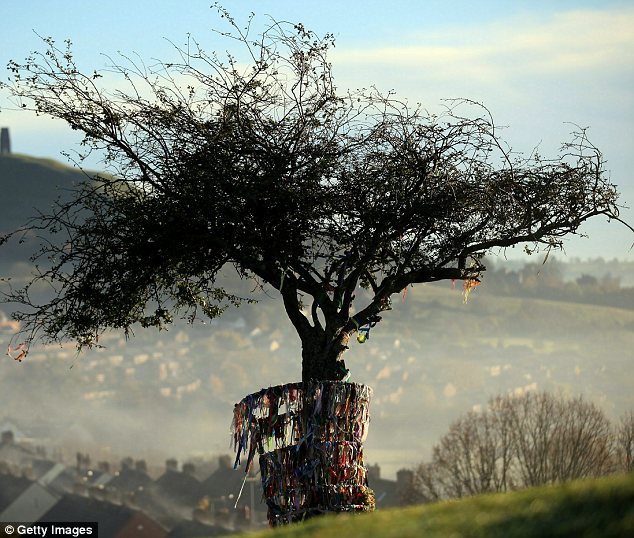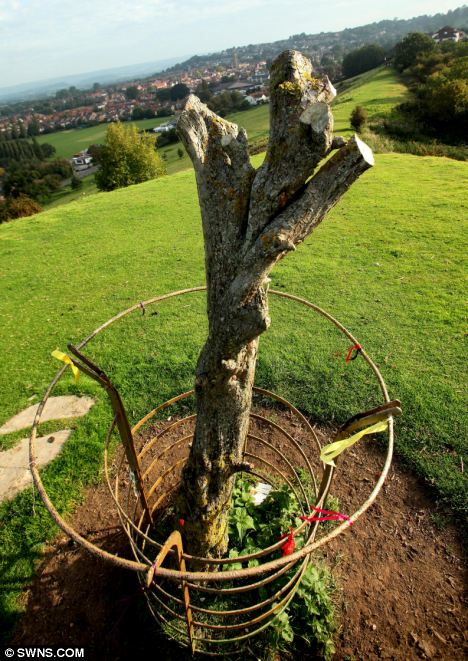On What We Lost — an Afterthought
Only today, a year after the event, did I come across this headline:
I had never heard of the Thorn of Glastonbury until I came across a reference to it in a SHORT HISTORY OF ENGLAND by GK Chesterton. The legend is that the staff of Joseph of Arimathea traveled to England after the crucifixion, bearing the Holy Grail, and has staff as he approached Glastonbury stuck fast and took root, becoming this tree. The Puritans hewed it down as a paganistic relict, but locals saved plantings of the tree and replanted them.
And then last year the limbs were hacked off during the night.
This the what it looked like before:
And after:
I cannot tell you how immensely disturbing and disgusting I find this hatred and contempt expressed, not in the act of vandalism itself, but in the spirit that cheers for vandals, as expressed in the comboxes below the article.
On commenter wags his head and says, “So let ‘god’ (or any imaginary friend of your choice) miraculously replace the tree to it’s former state…”
This is hardly an original thought: “He saved others; himself he cannot save. If he be the King of Israel, let him now come down from the cross, and we will believe him. He trusted in God; let him deliver him now, if he will have him: for he said, I am the Son of God. The thieves also, which were crucified with him, cast the same in his teeth.”
Other comments include a somewhat Puritan spirit casting contempt on Christians showing respect for the miraculous tree, and more than one of more modern spirit saying that, even thought the tree cannot be tied to any supernatural events (there being no such thing) it is cruel nonetheless to those who respect such things to destroy them.
To repeat the point made before: Professor Tolkien’s trilogy is an enduring work, and beloved by countless fans for two generations running, precisely because it was like that tree: a hint that something greater moves in the world than merely worldly powers. He has been hacked and hewn and hated from the beginning by the modernists, to whom Joseph is a myth, the Grail a fairy tale or a pagan remnant, and a tree merely lumber.
The modern age has lost or corrupted those imponderables on which civilization rests: civility, decency, piety and pity. Orcs hew down good trees, and hoot at those who weep for them. Those imponderables rest on something even more imponderable, a sense of the sacredness of God and His creation, man, and his creation, the City from which civility and civilization takes their names, and the laws, the customs and order of tradition those civic walls, literal and spiritual, defend.
When I say that the modern age has lost its magic, I do not mean that we have lost our gullibility to mummers and sleight of hand — that remains. I do not mean we have lost our regrettable primitive superstitions — that remains, and is stronger than ever. Consult your local phone psychic, or Army Chaplin performing a Wicca ritual if you don’t believe me, or talk to a glassy-eyed believer in Global Warming.
I mean we have lost the Thorn of Glastonbury.
To me the loss is more piercing, because it was a treasure I did not know was mine.
You see, my world, the world as it is, allows that this could indeed have been the very wood of the wand of Joseph of Arimathea, who walked the green hills in ancient times of England, and, by a miracle no odder than those which science teaches (is it not a miracle to create life from seawater, or man from ape?), to bring dead wood to bloom again.
In your world, the narrow make-believe world of the modern thinker, perhaps, the Thorn of Glastonbury could not grow, without being either a merely pagan idol or a piece of lumber to be cut down, or, worst of all, a tree to hug more deserving of life than a man, never to be cut down.
That hints to me that there is something wrong with your soil, or you are not getting enough light. Or you need Ents.


